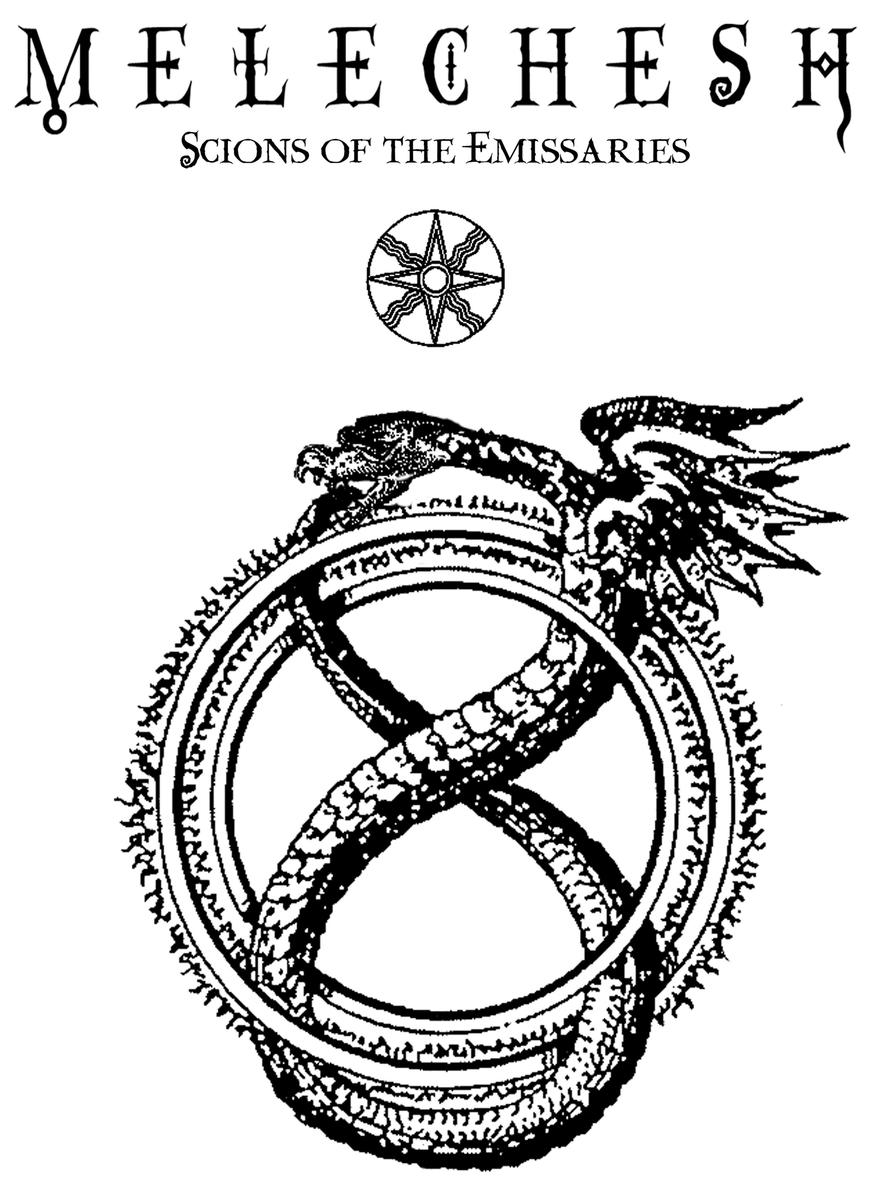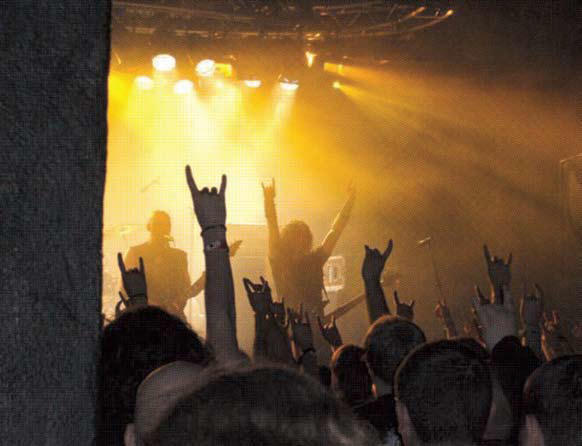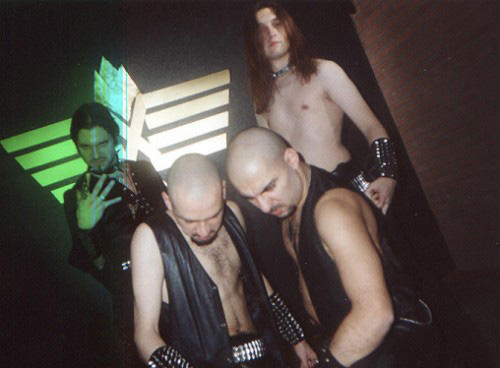
“It pisses me off when I see people from South America, Australia, Florida, or the Middle East trying to pretend they’re Vikings. I respect Norse mythology — I’m a cosmopolitan person. But you also have a rich culture. Try to celebrate that.”
So says Ashmedi, founder and frontman of Melechesh, a black metal band from East Jerusalem and an advocate for aggressive localism in metal. From their lo-fi debut, 1995’s As Jerusalem Burns, to their most recent full-length album, 2006’s Emissaries, Melechesh has eschewed the hyperborean visions of black metal’s Scandinavian wing, preferring equally harrowing legends drawn from the region’s pre-pre-Islamic past.
The group also incorporates elements of Middle Eastern vernacular music into its sound, especially the baladi and malfuf rhythms (mainstays of Arab pop and Egyptian dance tracks, as well as belly dance music). And their songs, at times, present distorted versions of melodies that have long signified “the Orient” in horror films and other popular entertainments the world over.
The remarkable thing is that it works. The fusion of metal’s darkest subgenre (characterized by blast-beat drumming, incessant nasal guitars, barely decipherable lyrics) and vernacular sounds of and from the Middle East ends up making perfect sense. Although, I should admit, it has always made sense to me. My family moved to Saudi Arabia when I was kid, and it was there that I discovered metal. My memories of Jubail, the newly industrial city where we lived, include listening to bootlegged cassettes of Iron Maiden and Ozzy Osbourne on my walkman while walking past minarets and souks. As I’ve developed my collection of Arab music, I hear perfect metal riffs in Abd al-Wahhab’s string sections, while the heavy male choruses that provide many a Fairuz song with its minor-key refrain could easily turn up at the end of a song by Judas Priest.

Ashmedi’s introduction to metal came courtesy of Mötley Crüe’s Shout at the Devil, a quadruple-platinum album that, when it arrived in East Jerusalem, might as well have come from space. He was nine years old at the time. “I flipped. It was so scary!” No one else was into it. “I said, ‘You guys don’t know what I listen to. It’s awesome!’” He got more and more into metal — an enthusiasm that was helped along by his family’s brief relocation to California. And he was intrigued by what he discovered. Metal bands had been drawing on Arab themes (or should I say, “Arab” “themes”) for years. “Eighty percent of your dark, black metal band names come from cities or situations that happened in the Middle East — Gehenna, Bethlehem, Bethel, Megiddo, Sodom…” Another touchstone for many extreme metalheads was the Necronomicon. A fictional tome invented in the 1920s by the dark fantasy writer HP Lovecraft, the Necronomicon, or Book of the Dead, suddenly appeared in a mass-market paperback edition in 1980, full of spells and rituals and stories drawn from Sumerian and Mesopotamian mythology.
It was precisely this occult fascination with the ancient Near East that led Ashmedi to create Melechesh. “Many Assyrians identify as Christians, and they’re proud of it,” he says, “but they forget where they come from.” Metal helped him “remember,” as it were. “I realized, I am an Assyrian, this is my culture.” This is, of course, the language of the blandest kind of multiculturalism, and there is often something naive about Ashmedi’s pronouncements. But his sentiments are banal only if taken at face value. When he says “this is my culture,” he’s not taking sides in Iraq, nor doing outreach to the Chaldean diaspora, nor making a plea for minority rights in Israeli society. He is, rather, making a home for himself in glorious ruin. His ethnic awakening was fueled by reading books on mythology, which in turn fuels his own songwriting. Tales of Assyrian gods or demons (sometimes the same thing) appear in songs, as with “Kurnugi’s Reign,” off 2001’s Djinn, a brisk summary of the descent of Inanna, aka Ishtar, goddess of love and war, who goes down to the underworld (Kurnugi) only to be torn limb from limb by her jealous sister Ereshkigal, goddess of the dead:
Remember ceremonial forms for her sister?
ERESHKIGAL! ERESHKIGAL!
Recall the spiteful guardian from the gates of ganzir?
IAK SAKKAKH!! IAK SAKKAKH!! IAK SAKKAKH!!!
Probably not coincidentally, the tale of Inanna’s descent, with a few choice Lovecraftianisms and not a few “IAK SAKKAKHS,” takes up half a chapter of the Necronomicon.
But then, this is how metal works. Metal is a quest for extremity; different musicians find different elements to push to the nth degree — speed, volume, distortion, lyrics, costumes, stage behavior, in one or another combination. Melechesh takes black metal’s already severe ethno-mythic tendency up several notches; it’s “extreme identity politics,” if you will, though in this case it leads not to church- or mosque- or temple-burnings, but to a wide-ranging spiritual quest.

Melechesh left East Jerusalem ten years ago. Ashmedi reconstituted the band in Holland (that is, the Netherlands), assembling a mixed crew that currently consists of Moloch — Palestinian, guitarist — and Xul — Dutch, drummer. (The Ukrainian Al’Hazred, their bass player for many years, recently left the group.) The move was primarily for professional reasons, he says, though he confesses that he found it increasingly difficult to navigate the conflicting worlds of his Israeli and Palestinian friends. Melechesh recently signed with Nuclear Blast, one of the most important metal labels, and just finished a massive European tour. Ashmedi is an ambassador for a lost civilization, and there is something awesome about the idea of rapt audiences singing along to, say, “Touching the Spheres of Sephiroth.” Metalheads are cosmopolitan, after all — most anything can get a hearing, so long as you can bang your head to it.